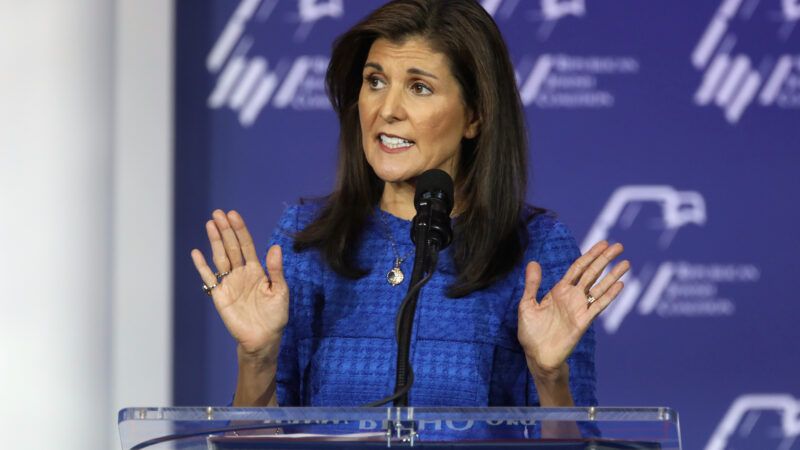Nikki Haley Opposed Boeing Subsidies at Tonight's GOP Debate. As Governor, She Gave Boeing Millions.
The former South Carolina governor can't decide whether she likes corporate subsidies or opposes them on principle.

At tonight's Republican presidential debate, former United Nations ambassador and South Carolina governor Nikki Haley took a lot of flak for her entanglements with corporate America.
"You left government service in 2018 with just $100,000 in the bank. Five years later, you're reportedly worth $8 million, thanks to lucrative corporate speeches and board memberships like you had with Boeing," said rival candidate Vivek Ramaswamy.
Haley defended her record by saying that when Boeing started to ask for government bailouts during the pandemic, she resigned from the board on principle.
"I served [on Boeing's board] for 10 months, and then when they decided after COVID that they wanted to go for a corporate bailout. I've never supported corporate bailout, so I respectfully stepped back and got off the board," said Haley.
It's a nice statement of free market principles. If only the former governor had stuck to them throughout her career.
When governor of South Carolina, Haley felt differently about corporate subsidies. In 2013, Haley signed into law a bill that gave Boeing $120 million in bond money to support an expansion of its manufacturing facilities in the state.
Before that, as a state legislator and gubernatorial candidate in 2009, Haley supported a package of $900 million in subsidies to Boeing to locate manufacturing facilities in the state, The Wall Street Journal reported earlier this year.
Haley and her surrogates have brushed off this criticism by saying that she was happy to spend South Carolinians' tax money to create jobs in South Carolina but draws the line at federal bailouts.
Haley "was proud to support the expansion of a major South Carolina jobs provider, helping thousands of local families and South Carolina businesses. That's entirely different from a Washington bailout that is far removed from most of the taxpayers who would pay for it," a campaign spokesperson told the Journal earlier this year.
Haley herself said tonight: "I love Boeing. They build good commercial airplanes. They build airplanes for our Air Force. I am proud of them. They employ a lot of people in South Carolina."
This is a distinction without a difference.
Corporate subsidies are always a transfer from one party to another, regardless of how geographically concentrated the benefactors and beneficiaries are.
It's true that federal taxpayers are getting screwed by a bailout of Boeing. The money they're forced to spend propping up the company could have otherwise gone to goods and services they valued more. That spending would also have "created" or "saved" jobs—in industries that consumers cared about more.
The same is true of subsidies paid by South Carolina taxpayers to support a company's South Carolina manufacturing facilities. Those tax dollars could have gone to things that South Carolinians actually wanted. Instead they went to Boeing.
The major distinction between state subsidies Haley supported and the federal bailout she didn't is that the costs of the former were concentrated on her constituents.
In fact, in one way, the corporate subsidies Haley supported for Boeing while governor are worse than the federal bailout she quit Boeing's board over.
She showered money on the company when it was riding high in a good economy. It was then, when the company needed no help attracting capital and customers, that Haley decided to funnel taxpayer resources to them. Yet Haley drew the line at supporting subsidies in 2020, when the company (like the rest of the economy) was facing extreme economic uncertainty.
As it turns out, Boeing didn't end up taking a taxpayer bailout during the pandemic. It issued additional debt instead and rode out the storm.
If it could do that then, when the world seemed to be falling apart, it obviously could have done it in 2013.
Rent Free is a weekly newsletter from Christian Britschgi on urbanism and the fight for less regulation, more housing, more property rights, and more freedom in America's cities.


Show Comments (12)